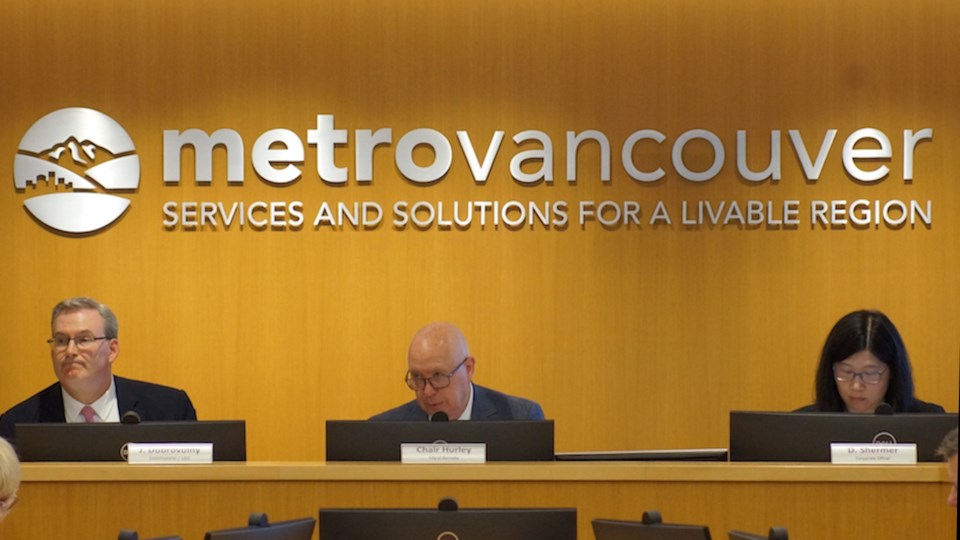The Metro Vancouver Regional District board of directors is calling on the provincial government to join a new committee aimed at reforming its own governance model.
The new governance review committee will largely explore changes to the board’s structure, according to board chair Mike Hurley, who formed the committee.
Hurley on Friday that concluded the board has become “large and unwieldy” with “increasing tensions and political differences” at the table.
“There is need for major systemic changes,” Surrey Mayor Brenda Locke told the board Friday.
Locke and all other board members passed a motion calling on the provincial government to install a liaison at the committee, as any board structure changes will require new provincial legislation.
Minister of Housing and Municipal Affairs Ravi Kahlon said he’s pleased the board is reviewing the report’s findings and recommendations, and that the board is creating a governance committee.
“Transparency and accountability among elected officials as well as a strong governance framework are key requirements to ensure people can trust and rely on them to use their tax dollars appropriately for core services in the region,” he said in a statement to BIV.
“We are reviewing the overall findings of the report, and I’m looking forward to discussing a positive path forward with the Metro Vancouver board.”
Some directors viewed Deloitte’s report less critically than others.
Richmond Mayor Malcolm Brodie and Burnaby Coun. Sav Dhaliwal—the two longest-tenured directors—joined in targeting recent media coverage of Metro Vancouver, which has focused on board remuneration and travel expenses in the wake of the organization’s nearly $3-billion cost overrun for the North Shore Wastewater Treatment Plant.
That extraordinary overrun resulted in the region’s homeowners receiving a
Muri noted that “this story still has legs, sadly,” while Brodie said the board needs “more balanced coverage” on this issue.
“The public continues to rely on what the media reported,” said Dhaliwal.
City of North Vancouver Mayor Linda Buchanan suggested the governance of Metro Vancouver would not be under such scrutiny were it not for the cost overrun and Shayne Gregg, the report’s author, did not disagree.
Gregg told the board his report was not intended to recommend “transformative” changes to the board.
“We need to read between the lines as well as what’s in the document that’s made clear,” said Locke.
What was clearer was Gregg’s defence of director remuneration, saying it was appropriate and in line with other publicly backed agencies such as TransLink, BC Hydro and the Vancouver Airport Authority.
Gregg was most assertive in making changes to remuneration around the edges.
The board voted unanimously on Friday to end double payment for meetings that go over four hours.
The board also eliminated remuneration for travel pertaining to Metro Vancouver business as well as converting a monthly stipend for committee chairs in favour of a double meeting fee.
Directors are currently paid $547 per meeting.
and curtailing the number of committees also in half.
West noted the changes made Friday are relatively unsubstantial as meetings rarely extend past four hours.
West himself is among several local mayors earning more than the premier on account of being paid for each of their board duties at local council and Metro Vancouver, but also the TransLink Mayors’ Council.
Hurley said the votes on the remuneration adjustments were merely preliminary or “quick” fixes based on the clearest recommendations from Gregg. It is understood the board could make more adjustments to remuneration stemming from the governance review committee.
However, the committee will largely examine what to do with the structure of the board, which is comprised of 41 elected officials from 23 local jurisdictions.
The Deloitte reported recommended a so-called "hybrid board" whereby appointed members oversee Metro Vancouver’s utility operations, which account for about 80 per cent of all work.
Deloitte also examined board models that would reduce the number of directors from 41 to 23, meaning one director per jurisdiction. This could solve some of the political impasse perceived at the board due to its large size, said the report.
The consulting and auditing firm also suggested a "corporatization" model, eliminating elected officials entirely. It did not suggest a model whereby directors are directly elected.
The goal, said Deloitte, is to “introduce a balance of professional experience, and enhance decision-making and risk management.”
The report did not . Some concerns have been raised Metro Vancouver is doing things
Deloitte also highlighted how directors are challenged by balancing interests of local jurisdictions and those of the region.
Vancouver Coun. Rebecca Bligh poured some cold water on that notion Friday, saying it is not unusual for local politicians, especially in big cities, to deal with competing priorities be they regional, provincial or federal.



